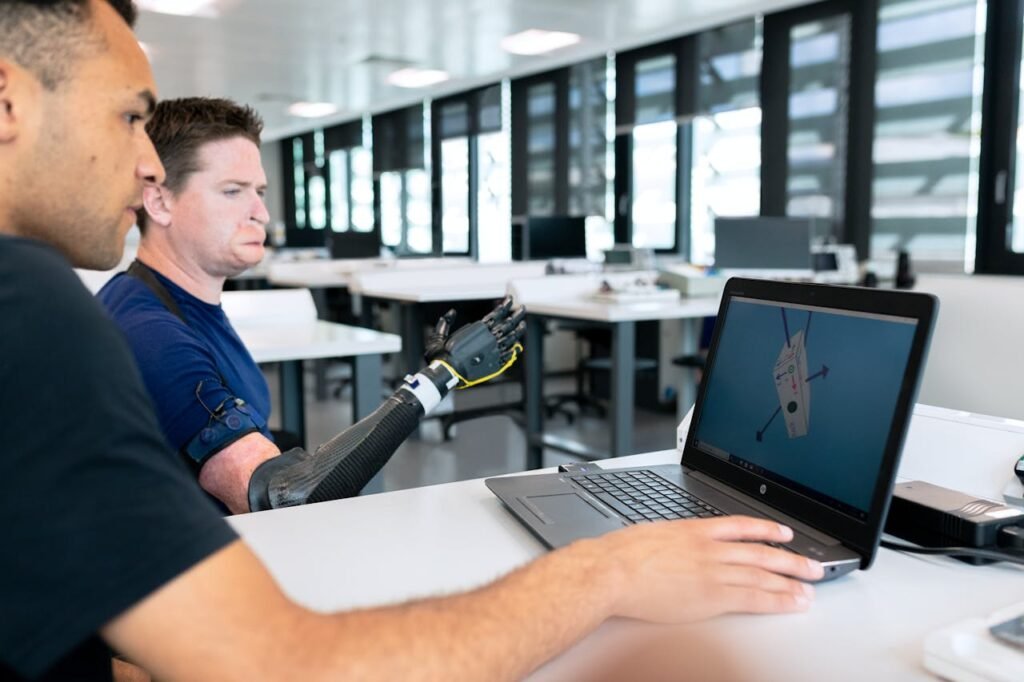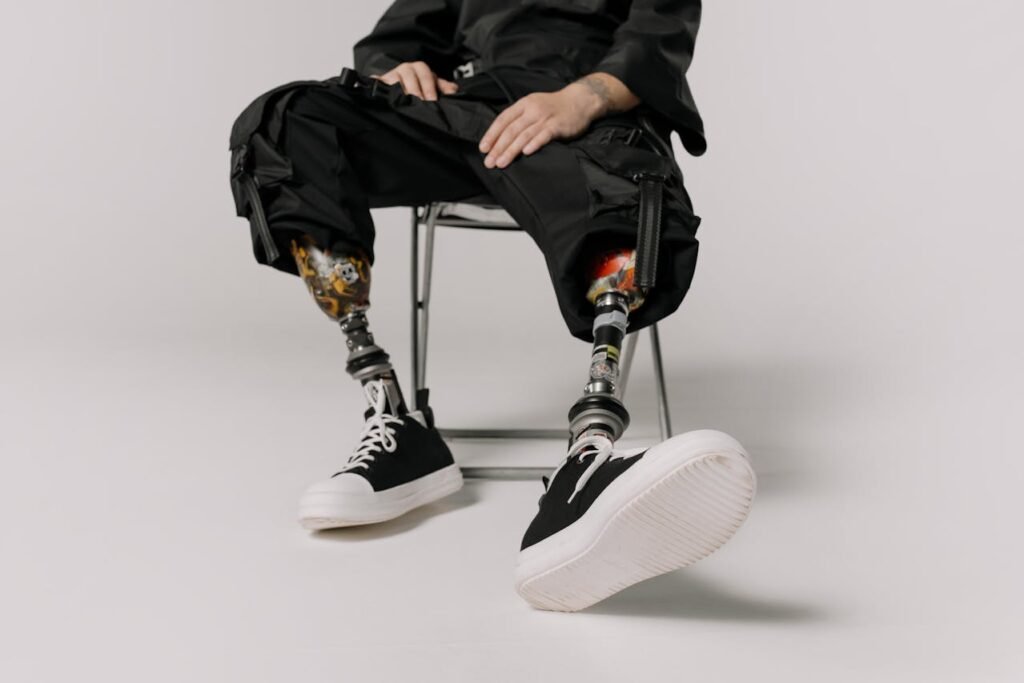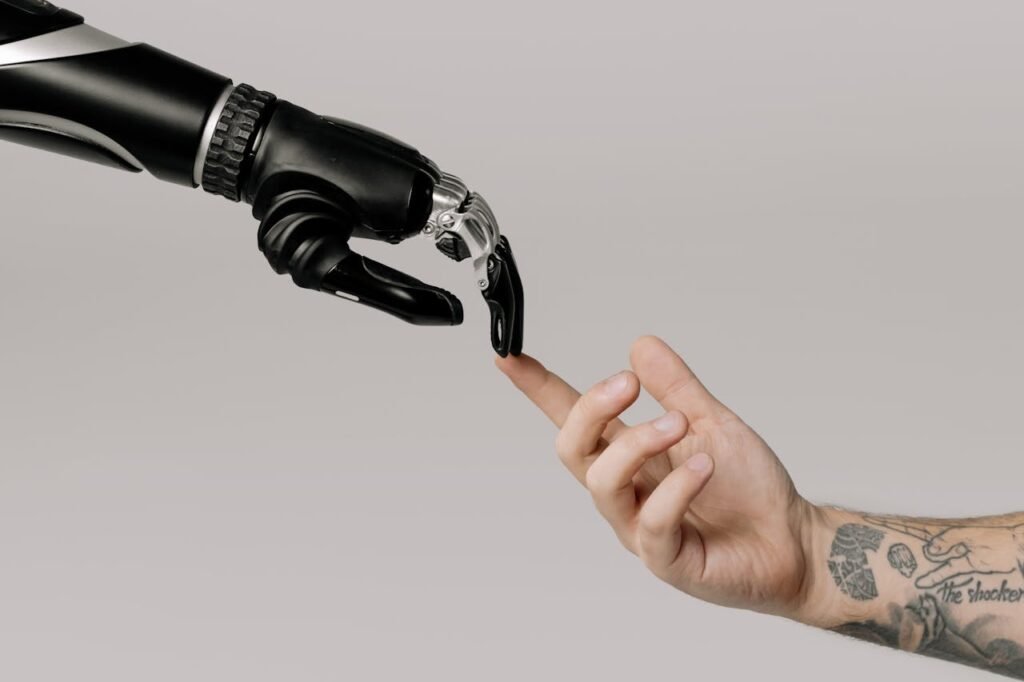The world is shifting towards sustainability in every sphere, from food production to transportation. The field of prosthetics is no exception. As global awareness about environmental conservation grows, prosthetics manufacturers are exploring innovative ways to create eco-friendly designs without compromising on functionality or quality. Sustainable prosthetics are paving the way for a future where mobility and independence are achieved responsibly, with minimal environmental impact.
At Robobionics, we believe that advanced technology and sustainability can go hand in hand. This article explores how eco-friendly materials are transforming modern prosthetic designs, the challenges and opportunities of adopting sustainable practices, and what it means for users and the planet.
The Rise of Sustainable Prosthetics
The demand for sustainable prosthetics is driven by a growing awareness of the environmental footprint associated with traditional manufacturing. Conventional prosthetics often rely on materials like plastics, metals, and composites, many of which are non-biodegradable and energy-intensive to produce.
As industries worldwide embrace sustainability, the prosthetics sector is following suit by integrating eco-friendly practices and materials into its designs.
Why Sustainability Matters
Prosthetics provide life-changing benefits for individuals with limb loss, but their production and disposal have long been overlooked as contributors to environmental challenges.
The production of conventional prosthetics often generates significant waste, consumes substantial energy, and relies on materials that take centuries to break down in landfills.
By adopting sustainable practices, manufacturers can reduce their environmental impact, support the global push for greener industries, and create a more ethical, responsible approach to assistive technology.
For users, choosing sustainable prosthetics aligns their personal needs with broader environmental values, fostering a sense of contribution to the planet’s well-being.

Breakthroughs in Eco-Friendly Materials
Sustainable prosthetics are being revolutionized by the introduction of innovative materials designed to reduce waste, lower energy consumption, and offer better recyclability. These materials are reshaping how prosthetics are made while enhancing their functionality and durability.
Biodegradable Polymers: Biodegradable plastics derived from natural sources, such as corn starch or sugarcane, are replacing petroleum-based plastics in prosthetic components. These materials decompose over time when exposed to specific environmental conditions, reducing landfill waste.
Recycled Composites: Using recycled carbon fiber and other composite materials allows manufacturers to minimize the demand for new raw materials while maintaining strength and lightweight properties essential for prosthetics.
Natural Fibers: Materials like bamboo and hemp are being explored for their strength, sustainability, and minimal environmental footprint. These fibers can reinforce prosthetic components, offering both structural integrity and eco-friendliness.
Plant-Based Resins: Resins derived from renewable plant sources are replacing traditional synthetic resins in prosthetic sockets and components, reducing reliance on fossil fuels.
Benefits of Sustainable Prosthetics
Sustainable prosthetics go beyond environmental benefits—they also offer advantages for users, manufacturers, and the broader community.
Lightweight and Comfortable Designs
Many eco-friendly materials are naturally lightweight, making them ideal for prosthetic applications. Lighter devices reduce strain on the user, improving comfort during prolonged wear. At the same time, these materials maintain the strength and durability needed for day-to-day use.
Improved Accessibility
By using recycled or renewable materials, manufacturers can often lower production costs, making prosthetics more affordable and accessible.
This is particularly impactful in regions with limited resources, where cost barriers often prevent individuals from accessing high-quality prosthetic solutions.
Challenges in Implementing Sustainable Prosthetics
While the concept of sustainable prosthetics is promising, transitioning to eco-friendly materials and practices is not without challenges. These obstacles must be addressed strategically to ensure that the industry can fully embrace sustainability without compromising on quality or functionality.
Material Performance and Durability
One of the key concerns when adopting eco-friendly materials is ensuring they meet the high performance standards required for prosthetics.
Prosthetic devices must withstand daily wear and tear, resist environmental factors such as moisture and heat, and provide long-term reliability.
While biodegradable polymers and natural fibers show great potential, ongoing research and development are needed to enhance their durability and suitability for demanding applications.
Manufacturers must balance sustainability with the need for materials that can maintain structural integrity over time.
Manufacturing Complexity
Switching to sustainable materials often requires overhauling manufacturing processes, which can be time-consuming and costly.
For instance, integrating plant-based resins or recycled composites into production lines may involve retooling equipment, training personnel, and conducting extensive testing to meet regulatory standards.
Additionally, sourcing sustainable materials in large quantities can be challenging, especially in regions where the supply chain for eco-friendly products is still developing.
This can lead to increased costs, which may deter smaller manufacturers from adopting sustainable practices.
Consumer Perception
For sustainable prosthetics to gain widespread acceptance, consumer perception must align with the industry’s efforts. Users may have concerns about whether eco-friendly materials compromise functionality, durability, or aesthetic appeal.
Overcoming these misconceptions requires clear communication about the performance and benefits of sustainable prosthetics.
Businesses can play a pivotal role in educating consumers by highlighting the rigorous testing and advancements that ensure eco-friendly devices meet or exceed traditional standards.
Sharing real-world success stories and testimonials can also build trust and confidence in sustainable designs.

Opportunities for Businesses in Sustainable Prosthetics
Despite the challenges, the shift toward sustainability offers immense opportunities for businesses in the prosthetics industry. By leading the charge, companies can differentiate themselves in the market, attract environmentally conscious consumers, and contribute to a global movement for responsible innovation.
Leveraging Green Branding
As sustainability becomes a priority for consumers worldwide, businesses that embrace eco-friendly practices can build stronger brand loyalty and appeal to a broader audience.
Highlighting the environmental benefits of sustainable prosthetics in marketing campaigns can position companies as pioneers in ethical and responsible manufacturing.
For example, emphasizing the use of recycled composites or biodegradable materials in a product line not only enhances its appeal but also aligns the brand with values of sustainability and innovation.
Businesses can further bolster their image by obtaining certifications from recognized organizations that validate their commitment to green practices.
Collaborating with Researchers and Non-Profits
Collaborating with academic institutions, research organizations, and non-profits can accelerate the development and adoption of sustainable materials.
These partnerships provide access to cutting-edge technologies, funding opportunities, and valuable expertise, enabling businesses to overcome technical and logistical challenges.
For instance, partnerships with material science researchers can lead to breakthroughs in eco-friendly polymers, while collaborations with non-profits can facilitate the distribution of affordable prosthetics in underserved regions.
These alliances not only drive innovation but also create a positive social impact, further enhancing a company’s reputation.
The Future of Sustainable Prosthetics
The future of prosthetics lies in combining cutting-edge technology with eco-conscious design. As the industry continues to innovate, the adoption of sustainable materials and practices is expected to accelerate, paving the way for a more responsible and inclusive approach to prosthetic manufacturing.
For businesses, this future represents both an opportunity and a responsibility to lead the charge in sustainable innovation.
Advancing Material Science
One of the most exciting prospects for sustainable prosthetics is the ongoing development of advanced materials that balance eco-friendliness with high performance. S
cientists and engineers are exploring materials like graphene-infused composites, which offer exceptional strength and flexibility, and bioengineered materials that replicate the properties of traditional plastics without the environmental impact.
As these technologies mature, manufacturers will have access to a wider range of sustainable options that can be tailored to specific prosthetic applications. This will enable the creation of devices that are not only durable and functional but also environmentally responsible.
Businesses that invest in research and development can gain a competitive edge by staying ahead of material trends and setting new standards for sustainability in the industry.
Integrating Circular Economy Principles
The future of sustainable prosthetics also lies in adopting circular economy principles, where products are designed with longevity, repairability, and recyclability in mind.
By creating prosthetics with modular components that can be easily replaced or upgraded, manufacturers can extend the lifespan of their devices while reducing waste.

For example, a prosthetic hand could be designed with interchangeable parts that allow users to replace worn-out components without discarding the entire device. Similarly, programs for recycling old prosthetics into new materials can minimize resource consumption and environmental impact.
Businesses that implement these practices can position themselves as leaders in sustainability while reducing costs associated with raw material procurement.
Expanding Access Through Sustainable Manufacturing
Sustainability can also play a key role in improving access to prosthetics in underserved regions. By leveraging cost-effective, eco-friendly materials and production methods, manufacturers can create affordable prosthetics without compromising on quality.
For instance, 3D printing technologies using biodegradable filaments offer a scalable and sustainable solution for producing prosthetics in remote or low-income areas.
These technologies enable localized production, reducing transportation costs and carbon emissions while meeting the unique needs of individual users.
For businesses, focusing on accessible sustainability creates opportunities to enter new markets and make a tangible difference in communities that need it most.
Educating Consumers and Building Awareness
The success of sustainable prosthetics depends not only on technological advancements but also on consumer acceptance. Educating users about the benefits of eco-friendly materials and practices is essential to overcoming misconceptions and driving adoption.
Businesses can use storytelling to connect with consumers on an emotional level, highlighting the positive impact of sustainable prosthetics on both individuals and the planet.
Campaigns that feature testimonials from users who have embraced sustainable devices can inspire others to make environmentally conscious choices.
Additionally, transparency about the sustainability practices involved in manufacturing—such as the sourcing of materials and the reduction of carbon emissions—can build trust and loyalty among consumers.
A Collaborative Path Toward Sustainability
The journey toward sustainable prosthetics requires collaboration across industries, governments, non-profits, and end users. Achieving meaningful progress involves shared efforts to address environmental challenges while meeting the growing demand for affordable and high-quality prosthetic solutions.
Partnering with Research Institutions
Academic institutions and research organizations play a vital role in developing the next generation of sustainable materials and manufacturing processes.
Businesses can benefit from partnering with these entities to access cutting-edge research, participate in joint projects, and gain insights into emerging trends.
For instance, working with universities focused on material science could lead to the discovery of biodegradable alternatives to traditional plastics or lightweight composites that enhance both functionality and sustainability.
These partnerships can also open avenues for grant funding and pilot programs, reducing the financial burden of innovation.
Collaborating with Policymakers
Policymakers influence the regulatory landscape that governs sustainability in manufacturing. By engaging with government agencies and advocating for incentives like tax breaks, subsidies, or grants for sustainable production, businesses can help shape policies that benefit the entire industry.
For example, advocating for regulations that encourage the use of recycled materials or establish standards for sustainable prosthetics can drive industry-wide adoption of eco-friendly practices.
Businesses that actively participate in policy discussions position themselves as leaders and influencers in the field.
Empowering Communities Through Education
Sustainability is most impactful when it resonates with the communities it serves. Educating users, healthcare providers, and advocacy groups about the benefits of sustainable prosthetics fosters a shared commitment to environmental responsibility.
This can be achieved through workshops, webinars, and public awareness campaigns that emphasize the positive outcomes of eco-friendly designs.
For businesses, these efforts go beyond marketing—they build trust and loyalty by demonstrating a genuine commitment to creating value for both individuals and the planet.
Engaging with communities also provides valuable feedback that can inform product development and improve the user experience.
Driving Industry Collaboration
No single organization can tackle the challenges of sustainability alone. Cross-industry collaboration, such as forming coalitions or participating in sustainability-focused forums, can amplify impact and drive faster progress.
These platforms allow businesses to share best practices, pool resources, and collectively address barriers to sustainable production.
For example, a coalition of prosthetics manufacturers might work together to establish a shared supply chain for sustainable materials, reducing costs and ensuring consistent quality.
Similarly, collaborations with organizations in related fields—such as robotics, material science, or healthcare—can inspire innovative solutions and expand the possibilities of sustainable prosthetic design.

Transforming Challenges into Opportunities
The shift toward sustainable prosthetics is not without obstacles, but each challenge presents an opportunity for growth and innovation. By addressing issues like material durability, manufacturing complexity, and consumer awareness, businesses can pave the way for a new era of responsible prosthetic design.
Pioneering Material Innovation
One of the most significant challenges in sustainable prosthetics is finding materials that are both eco-friendly and capable of meeting the rigorous demands of prosthetic applications. Users rely on prosthetics for durability, comfort, and functionality, making material performance non-negotiable.
This challenge pushes manufacturers to explore new frontiers in material science, from bioengineered composites to advanced biodegradable polymers.
For businesses, investing in R&D to discover and refine these materials is not just about solving a problem—it’s about gaining a competitive edge.

By leading the way in developing high-performance, sustainable materials, companies can position themselves as innovators in a rapidly evolving market.
Additionally, patents and proprietary materials can open new revenue streams while fostering industry partnerships with researchers and suppliers.
Reimagining Manufacturing Processes
Traditional manufacturing processes often involve significant waste, energy consumption, and reliance on non-renewable resources. Transitioning to sustainable practices requires a complete rethinking of how prosthetics are designed and produced.
This challenge is an opportunity for businesses to modernize their operations, reduce costs, and enhance efficiency.
For example, adopting additive manufacturing techniques like 3D printing can drastically reduce material waste and enable localized production. By producing prosthetics closer to end users, companies can lower transportation emissions while offering customized solutions tailored to individual needs.
These advancements also allow businesses to align their practices with global sustainability goals, making them more attractive to eco-conscious consumers and investors.
Expanding Market Access
The cost of sustainable prosthetics can be higher due to the investment in advanced materials and technologies. This poses a challenge in reaching price-sensitive markets, particularly in developing regions.
However, this challenge is an opportunity for businesses to innovate in accessibility and affordability.
One strategy is to develop scalable solutions that balance eco-friendliness with cost-effectiveness. For instance, creating modular prosthetics with interchangeable parts allows users to replace or upgrade components without purchasing an entirely new device.
This approach not only reduces waste but also lowers costs, making prosthetics more accessible to a wider audience.
Additionally, businesses can collaborate with non-profits, government programs, and international organizations to subsidize costs and expand access to sustainable prosthetics.
These partnerships not only help bridge the affordability gap but also position businesses as socially responsible leaders in the field.
Educating Stakeholders
Another significant challenge lies in shifting perceptions about sustainable prosthetics. Users, healthcare providers, and insurers may question whether eco-friendly designs compromise quality or performance.
This skepticism underscores the need for education and awareness to build trust and confidence in sustainable solutions.
Businesses can seize this opportunity by leading educational initiatives that demonstrate the benefits of sustainable prosthetics.
Offering workshops for healthcare providers, publishing user success stories, and hosting community events are effective ways to showcase the durability, functionality, and environmental impact of these devices.
Transparent communication about testing standards and performance benchmarks further reassures stakeholders that sustainability and quality go hand in hand.
Building a Stronger Brand Identity
Challenges in sustainability provide an opportunity for businesses to reinforce their brand identity. By actively addressing environmental concerns and adopting forward-thinking practices, companies can align their mission with the values of their customers and partners.
This creates a deeper connection with users who are increasingly prioritizing sustainability in their purchasing decisions.
For instance, incorporating sustainability into every aspect of operations—from product development to packaging—demonstrates a holistic commitment to environmental responsibility.
Sharing these efforts through marketing campaigns, social media, and corporate reports strengthens the brand’s reputation and fosters loyalty among eco-conscious consumers.
Shaping the Industry’s Future
As the demand for sustainable prosthetics grows, businesses have a unique opportunity to shape the direction of the industry. By overcoming challenges with innovative solutions and collaborative approaches, companies can set new benchmarks for sustainability that inspire others to follow suit.
For example, participating in industry-wide coalitions or working with policymakers to create sustainability standards for prosthetics ensures that environmental responsibility becomes a core value across the sector.
Businesses that take the lead in these initiatives not only influence positive change but also position themselves as pioneers and thought leaders.

Conclusion
The shift toward sustainable prosthetics represents a pivotal moment in the evolution of assistive technology. By integrating eco-friendly materials and responsible manufacturing practices, the industry is demonstrating that innovation and environmental stewardship can coexist.
Sustainable prosthetics not only meet the needs of individuals seeking mobility and independence but also contribute to a healthier, more sustainable planet.
For businesses, embracing sustainability is more than an ethical choice—it is a strategic opportunity to lead the market, engage eco-conscious consumers, and drive meaningful change.
From leveraging advanced materials and circular economy principles to fostering collaborations and advocating for supportive policies, the possibilities for impact are endless. At Robobionics, we are committed to shaping this future through relentless innovation and a dedication to sustainability.



